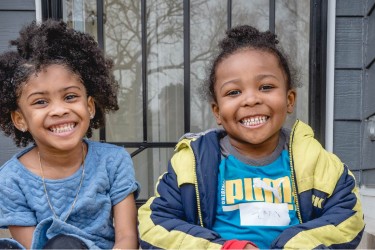Back to School: Children and the Benefits of a Good Home
Investing in affordable, quality housing is investing in kids and their futures. Studies have shown time and time again that a safe and stable household significantly impacts school outcomes for children. However, with 10% of the Chicago population currently facing critical housing needs, families are unable to meet their full potential.
As many know from experience, Chicago has an incredibly competitive housing and rental market. So much so that families end up making personal sacrifices at the expense of their well-being. Studies show that there are four dimensions of housing conditions that may affect school performance for children: housing affordability, housing quality, residential stability, and neighborhood conditions (Urban Institute). Negative conditions in any one of these dimensions are enough to drastically decrease a child's ability to thrive.
Here’s what happens when:
>>Housing isn’t affordable
Housing is often the biggest expenditure in any household, but experts say families should not spend more than 30% of their income on housing or they risk making personal sacrifices. A recent study showed that, nationally, in order to afford a modest one-bedroom apartment, a person would have to earn $17.90 per hour (Chicago Tribune). The lack of affordability in housing can lead to difficult choices in household budgets, including the need to choose between paying for rent, food, or even healthcare.
>>Housing isn’t decent
In order to find an affordable living situation, families will often make sacrifices to the quality of their housing (Urban Institute). To save money, families will often choose to live in cramped quarters that provide less than adequate space for all members of the family or in homes where mold, infestation, and poor insulation are present. Children living in overcrowded homes often lack the necessary tools to do well in school, while health problems due to housing quality may affect school attendance. Mental, emotional, and physical stress from consistent poverty or insecurity can also impact a child’s health, school attendance, and school performance (Huffington Post).
>>Housing isn’t stable
Low-income students are more likely to change schools frequently due to change in housing, which can result in behavioral problems and lower test scores (Urban Institute). A recent study showed that children who transferred due to a school closure were two months behind their peers in math and one and a half months behind in reading (Chicago Reporter).
>>Neighborhood conditions are declining
When families are unable to deal with the burden of rent, they often migrate to low-income areas, where rent is affordable, but quality of schools may not appear to be as high. A disconnect between school and neighborhood occurs then as families opt out of neighborhood schools to enroll in schools in other communities. These neighborhood schools then suffer as funding and resources diminish due to decreased attendance rates (The Atlantic).
However, here's what happens when:
>>Housing is decent and affordable in a stable neighborhood
Living in quality, affordable housing leads to better school outcomes. Living in a house that comfortably accommodates every member of the family can provide a stress-free environment for children to accomplish homework assignments (Urban Institute). With less sacrifices being made at the expense of healthy food and healthcare, an affordable and safe home can lead to happier, more successful children. According to a recent study by the Huffington Post, children of homeowners:
• Are 25% more likely to graduate from high school
• Are 116% more likely to graduate from college
• Have 9% higher math scores
• Have 7% higher reading scores
• Are 59% more likely to own a home within 10 years of moving from their parents’ household
As the school year approaches, we are proudly reflecting on the accomplishments Habitat Chicago families have made. Natasha N homeschools her children and has a very safe and healthy place to do so—her oldest son, Nate, is now readying for college. Alleania P’s younger brother Tanasse is a straight-A student, who works hard to finish his homework quickly so he can have time to go bowling with friends. Shuanta S is saving up for her family’s first trip to Disney World to reward her kids for good grades and good behavior at home. Tonya M is working hard on the construction site to provide a home with space for her daughter Kayli to complete homework and do art projects with her grandmother.
When you support Habitat Chicago, you enable families to build healthy futures for their children. The importance of this cannot be overstated - after all, children are the future, right?
